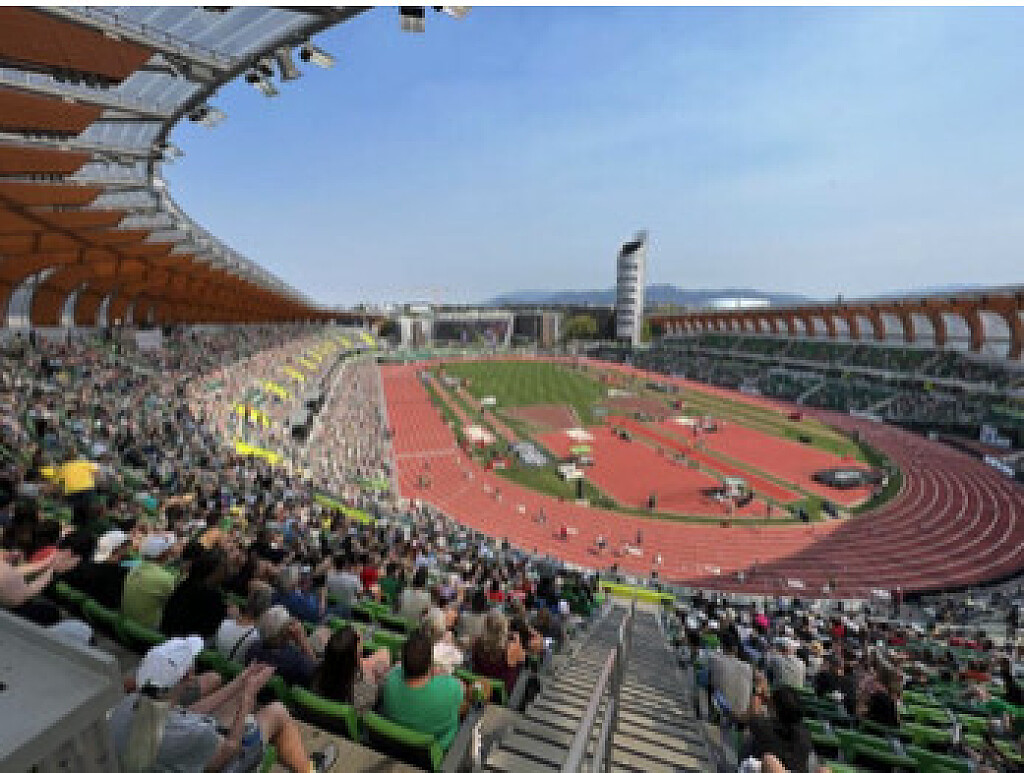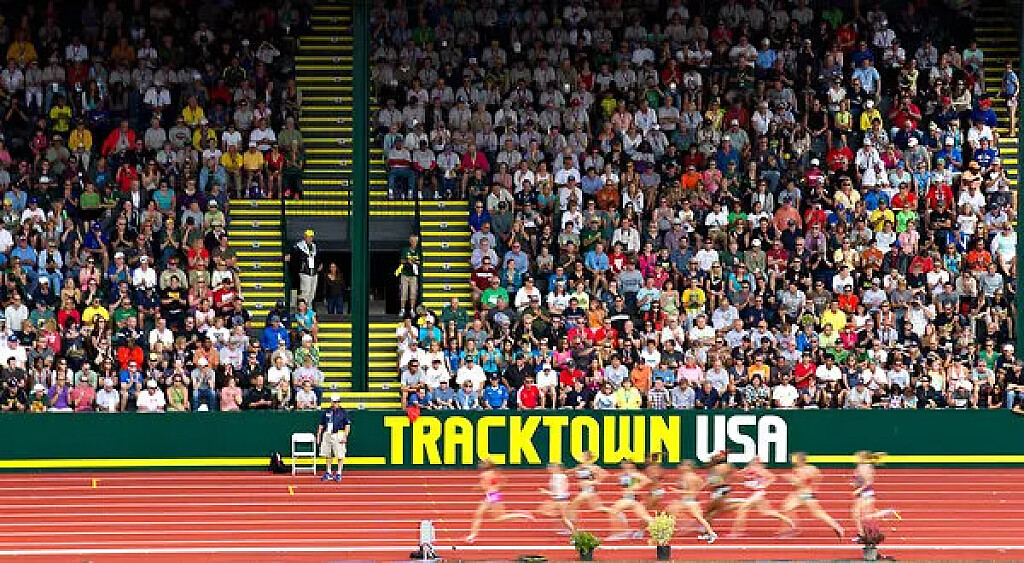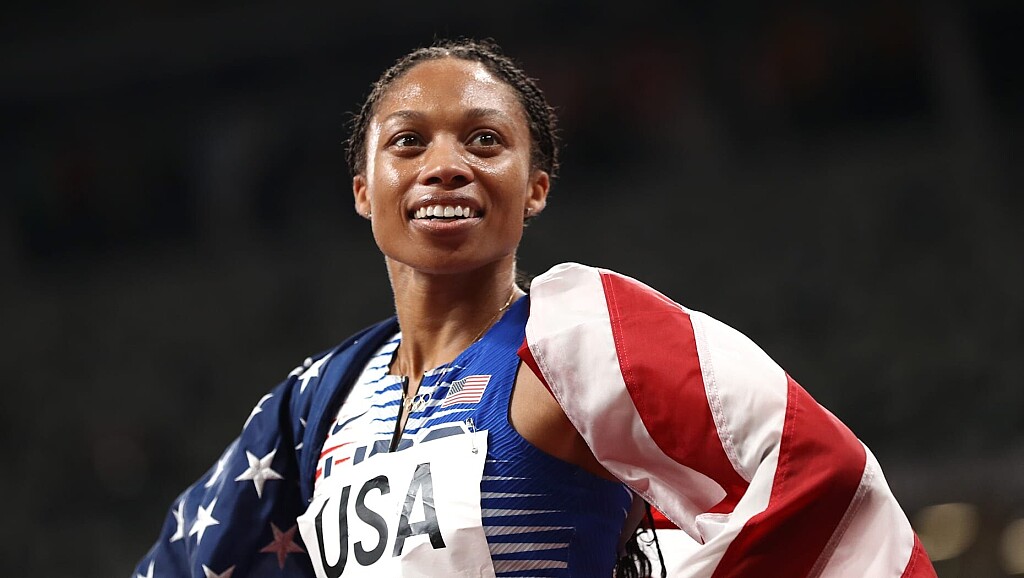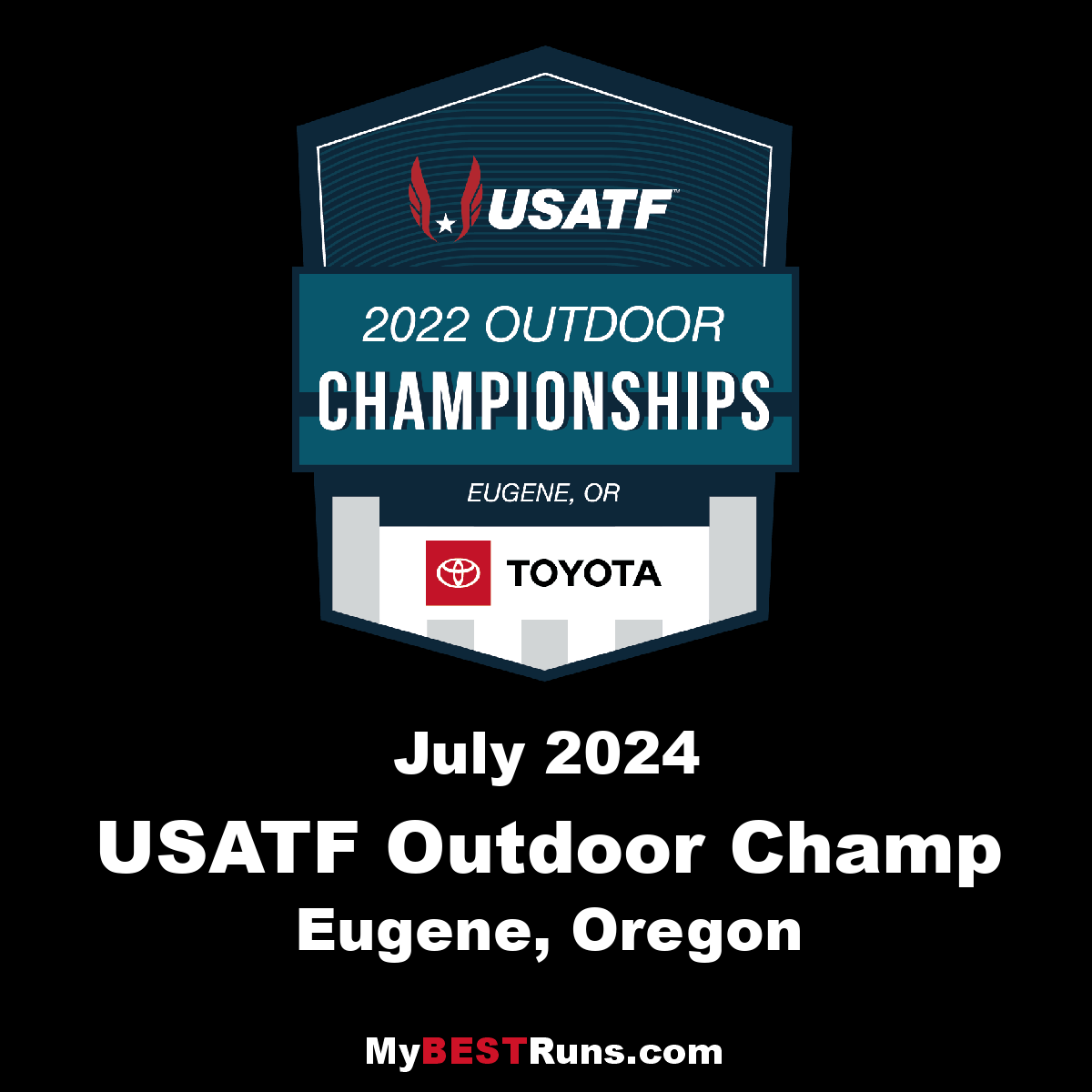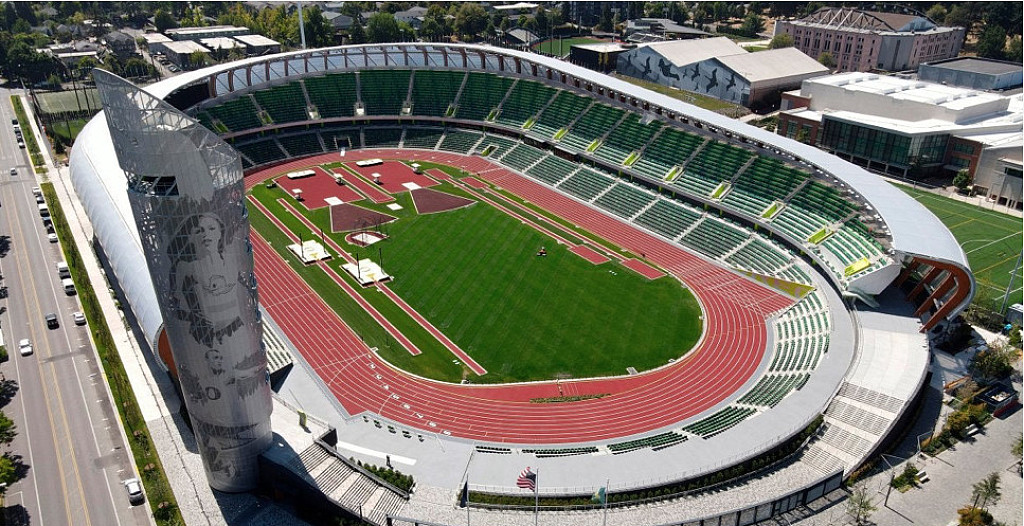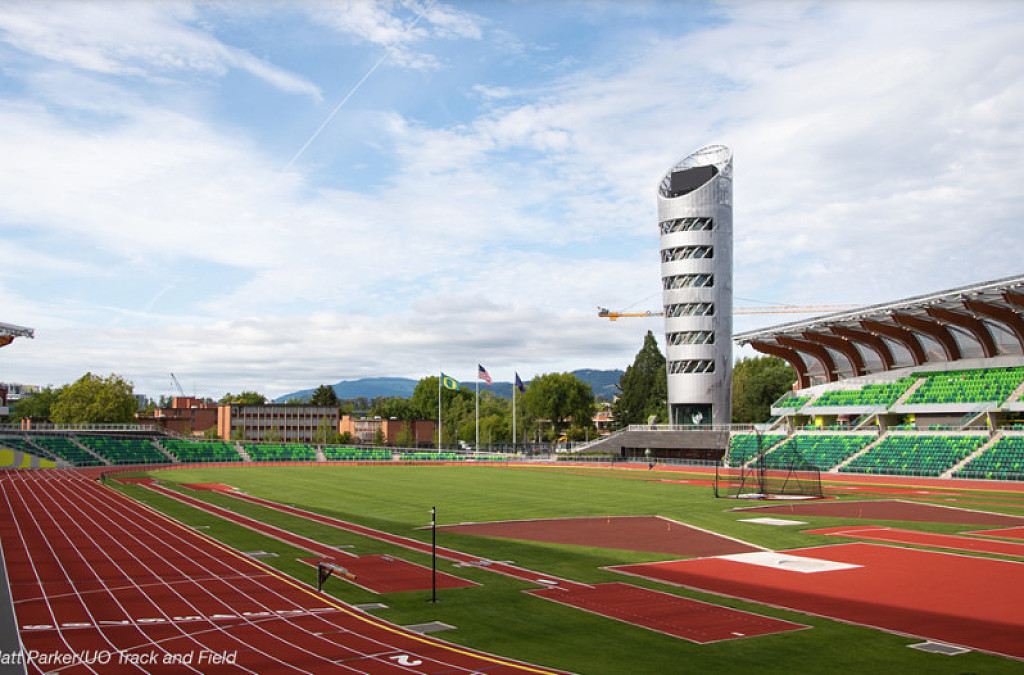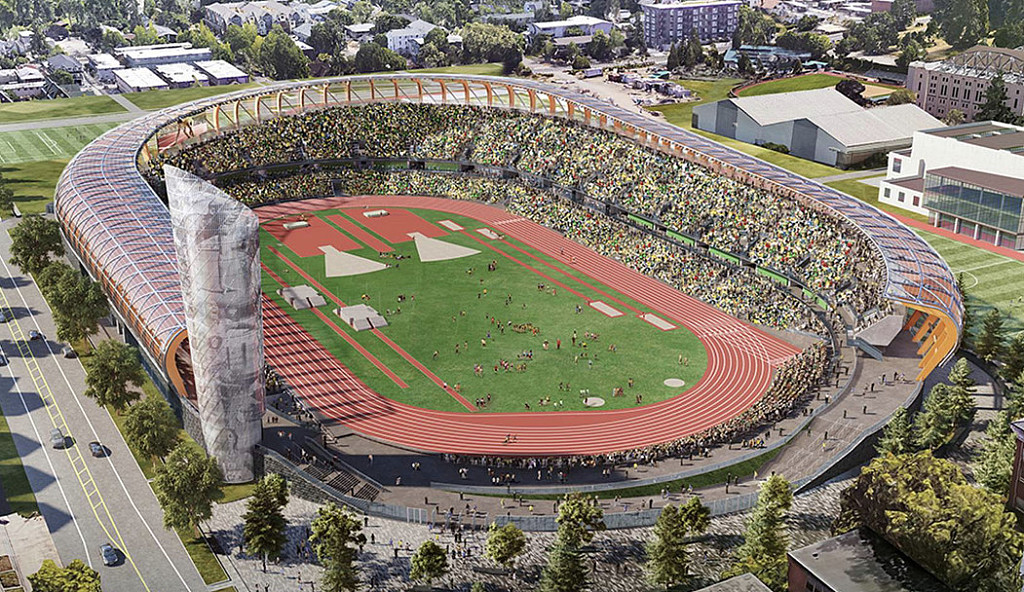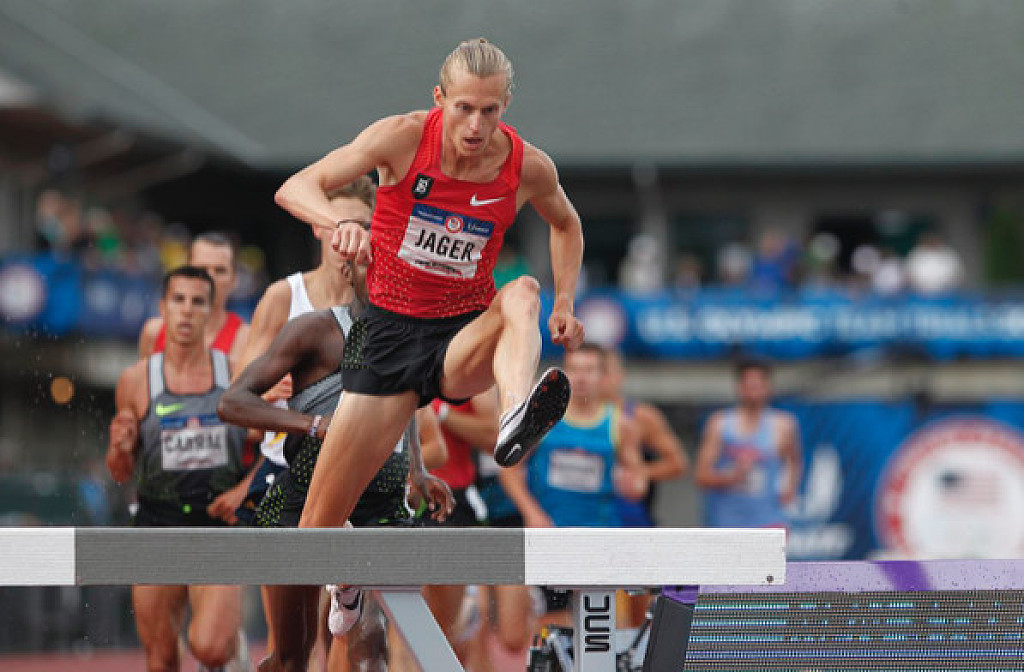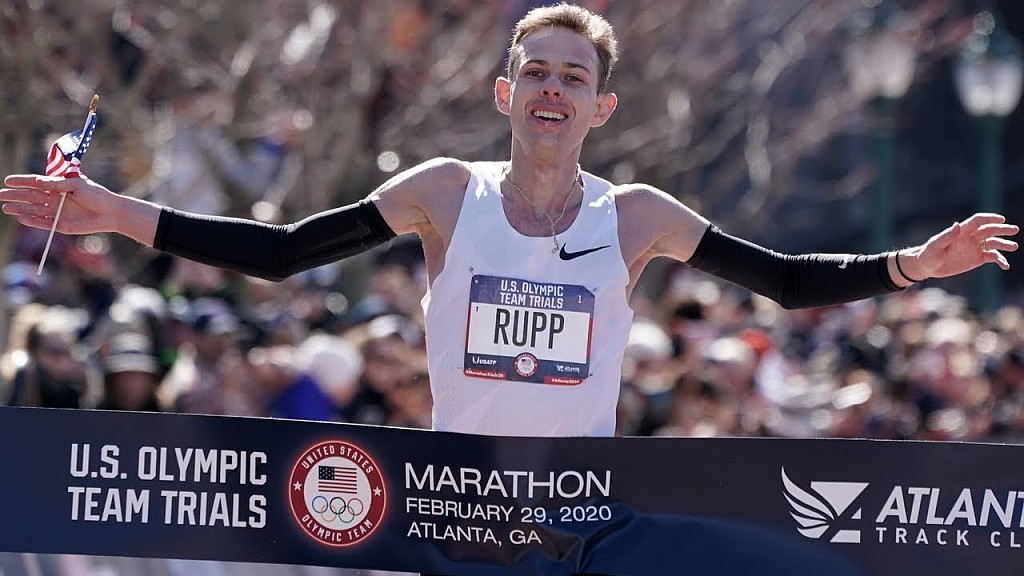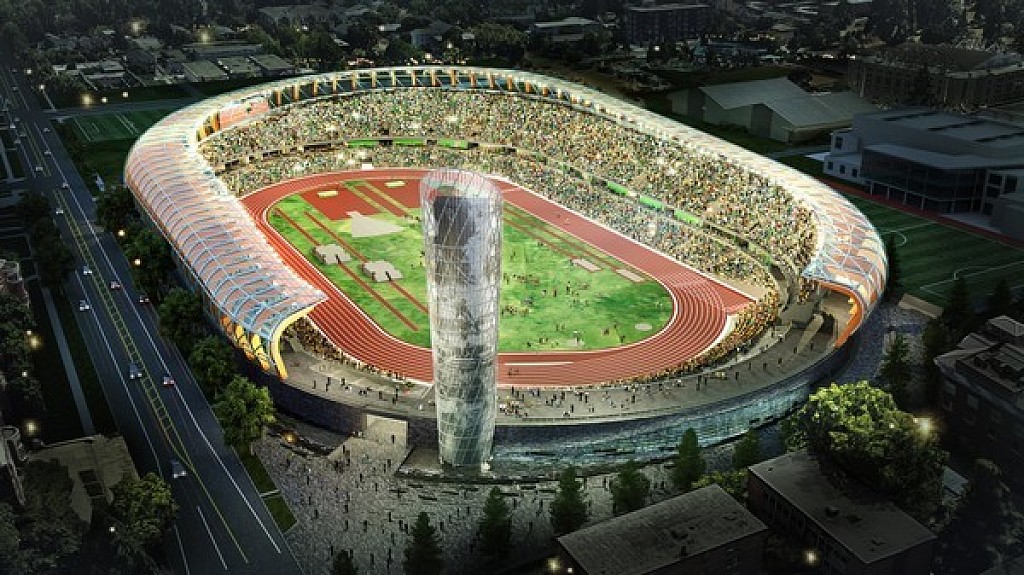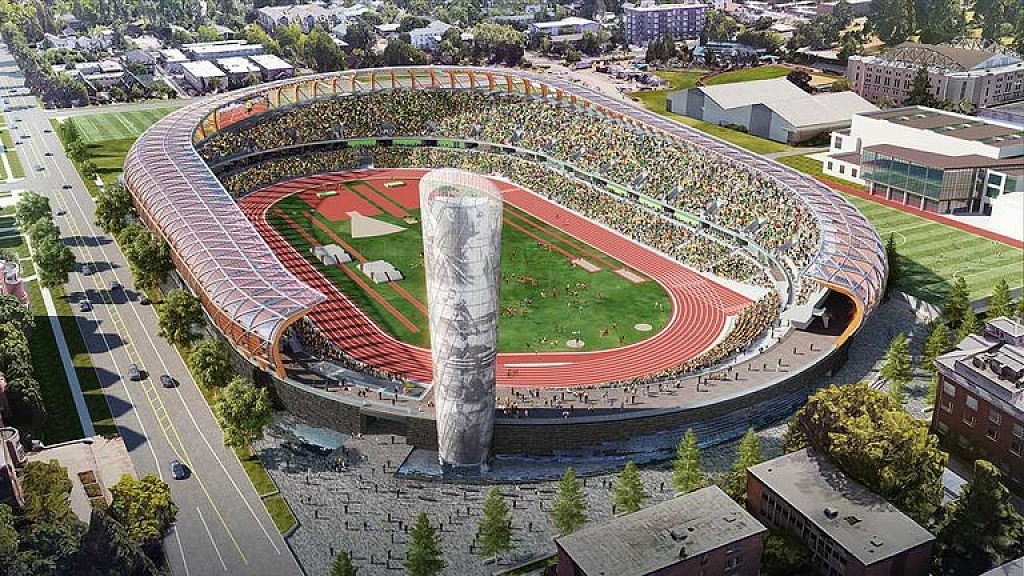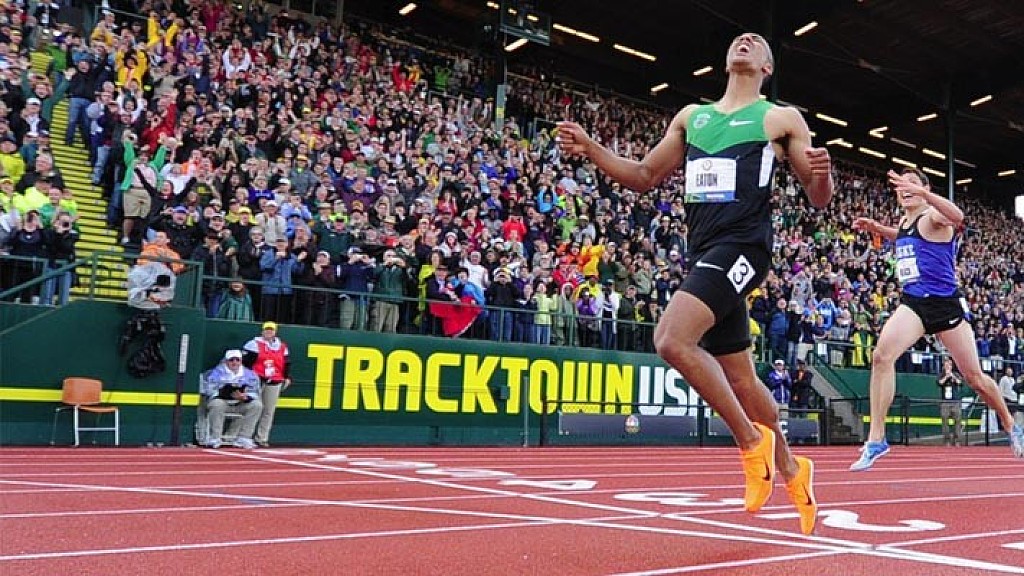Running News Daily
Running News Daily is edited by Bob Anderson. Send your news items to bob@mybestruns.com Advertising opportunities available. Train the Kenyan Way at KATA Kenya and Portugal owned and operated by Bob Anderson. Be sure to catch our movie A Long Run the movie KATA Running Camps and KATA Potato Farms - 31 now open in Kenya! https://kata.ke/
Index to Daily Posts · Sign Up For Updates · Run The World Feed
Articles tagged #Tracktown USA
Today's Running News
Eugene Will Host 2024 US Olympic Track & Field Trials, Again
The next US Olympic Track and Field Trials will be held in ….. Eugene, yet again.
Yes that’s right. Hayward Field will host the 2024 US Olympic Team Trials – Track & Field from June 21-30, 2024, USATF announced in a statement on Thursday. The Olympic track & field program will begin four weeks later, on August 1 in Paris.
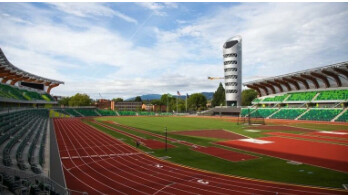
2024 will be the fifth straight Olympic Trials hosted by Eugene (2008, 2012, 2016, 2021, 2024) and Eugene’s fourth straight USATF Outdoor Championship. Since the new Hayward Field opened in 2020, no other stadium has hosted the US championships.
That means that in 2024 — just as in 2015, 2016, 2021, and 2022 — the three biggest meets in American track & field will be held at Hayward Field: the Prefontaine Classic, the NCAA championships, and the USATF championships/Olympic Trials. Here is what the schedule will look like for 2024:
May 25: Prefontaine ClassicJune 5-8: NCAA championshipsJune 21-30: US Olympic Trials
Quick Take: Eugene does a fantastic job hosting big meets, but it’s time to give someone else a chance to host the Olympic Trials
Let’s make a few things clear. The new Hayward Field is the best track & field stadium in the country, and Eugene has a terrific local organizing committee in TrackTown USA that knows how to stage big meets. The 2024 Olympic Trials are going to be terrific — they always are.
When you’ve got a beautiful new stadium like Hayward Field, you don’t want it to go to waste. But from 2021-2024, almost every major track meet in the US will have been staged at Hayward Field. The three most important track meets in the US are the Prefontaine Classic (the US’s only Diamond League), the NCAA championships, and the USATF championships/Olympic Trials. During a four-year period, 11 of those 12 meets will have been hosted in Eugene. And that does not even include the biggest meet Eugene has ever hosted — the 2022 World Championships.
That’s a recipe for major Eugene fatigue.
The Prefontaine Classic obviously isn’t moving out of Eugene, and the NCAAs are locked into Eugene through 2027. But it’s a missed opportunity to hold USAs in Eugene every single year, particularly the Olympic Trials. There are a limited number of diehard track fans in the US, and any diehard who has wanted to visit the new Hayward Field has probably done it at this point. If a husband and wife are huge track fans and they already figured out a way to take their kids to Eugene for Worlds, are they really going to want to go back again to the same location for the Trials?
The Olympic Trials should be in Eugene at most once every eight years. The last two normal* Trials drew more than 20,000 fans per day (21,644 in 2012; 22,1222 in 2016) but it’s foolish to suggest that the Trials can only do those sort of numbers in Eugene.
*Due to the COVID-19 pandemic, there was ticketing uncertainty about the 2021 Trials until the very last minute, which meant attendance numbers were a fraction of previous years
In the United States, when you throw the word Olympic in front of anything, people go crazy. And the last few US championships has shown that the built-in track fanbase in Eugene — the diehards who will go to every meet — has dwindled significantly.
We’re confident that if you staged the Olympic Trials in Austin, Des Moines, Omaha, Sacramento, or Mt. SAC, you’d draw big crowds. The Olympic Trials will do well anywhere they are held.
The question then, is why isn’t this happening?
“We all know that getting [to Eugene], it’s trying,” said Will Leer, chair of the USATF Athlete Advisory Committee, when LetsRun asked him about this at USAs in July. “Small airport, it’s expensive, hotels are minimal. But the process by which championships are awarded is through a bid. That much is well-known throughout all of USATF. And time and time again, TrackTown comes to the table with the best bid.”
Eugene certainly has a lot to offer, but we also don’t how much competition there is to host these events. It’s not as simple as USATF just awarding the Trials to a different city. A potential Trials host needs a world-class track facility and a local organizing committee interested in bidding for the Trials, which requires dollars.
Sarah Lorge Butler reports that Eugene paid at least $3 million to host the 2020 Trials, writing, “TrackTown paid a nonrefundable rights fee of $500,000 and the total prize purse of $1.4 million. They also had obligations to provide $1.1 million for athlete support during the meet, to be used at USATF’s sole discre
It’s an expensive undertaking for any local organizing committee. We know Eugene has the dollars. It’s unclear whether anyone else does (If you know of any other city that bid for the Trials, please email us at letsrun@letsrun.com)
If it’s simply a matter of USATF needing to find $3 million to put on the Trials, we know where they could find it. USATF head Max Siegel was paid a ridiculous $3.8 million in compensation in 2021; reduce that to a more reasonable $800k and you could hold the Trials wherever you wanted without any financial impact on USATF.
by Let’s Run
Login to leave a comment
It Shouldn’t Be This Hard to Be a Running Fan
Despite incredible performances at the USATF Outdoor Championships, the meet’s presentation failed to make the sport accessible for a wider audience.
The USATF Outdoor Championships were last weekend. But unless you made the trek to Eugene, Oregon, or you knew exactly where to watch at exactly the right time, you might have missed some (or all) of the action.
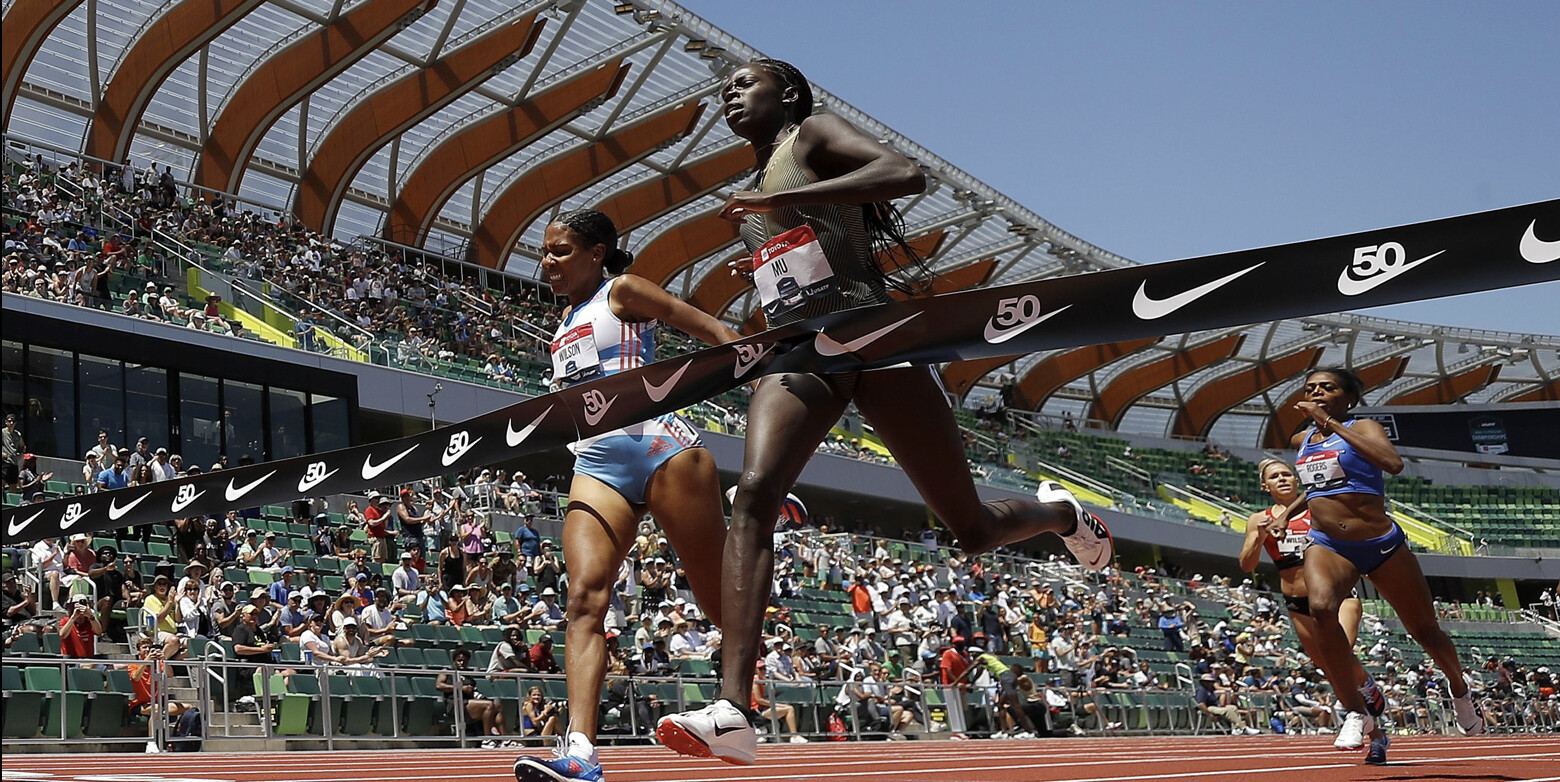
Even if you managed to watch the meet, you might have been left wondering who actually qualified to represent Team USA at the World Athletics Championships from July 15–24. Why will sprinter Christian Coleman run worlds after skipping out on the 100-meter final, despite running the rounds? But Jonathan Davis, who finished second in the men’s 1500 meters, did not qualify? There are answers to these questions, but such answers require prior knowledge of an elaborate qualification system that’s bound to confuse the casual viewer.
Those unclear qualification parameters, along with schedule changes, expensive travel and lodging, and an inconvenient number of streaming services, turned a celebration of athleticism into a Twitter gripe-fest, led by some of the sport’s biggest stars.
That’s not to say the U.S. championships weren’t exciting. Quite the opposite, in fact—the best part of the championships were the athletes’ performances. But everything outside the physical races, throws, vaults, and jumps was simply not on par with other professional sports’ presentations.
How can running become a more accessible sport to the general public? A lot of factors are at play, but critiquing the current shortcomings is step one.
Eugene is difficult and expensive to get to
Hayward Field is undoubtedly a historic venue in track history, and its home city, Eugene, is often dubbed Tracktown USA. So it makes sense that it should host major U.S. meets. But that doesn’t mean it should host all of the important events.
Between Memorial Day weekend and late July, the University of Oregon stadium will have hosted the Prefontaine Classic, the NCAA Division I Outdoor Championships, the USATF Outdoor Championships, and the World Athletics Championships—the four best meets in the U.S. this year.
It’s definitely an outlier year—the World Athletics Championships are on U.S. soil for the first time—but that means the NCAA championships and USATF Outdoor Championships should have been held elsewhere. (The Prefontaine Classic won’t and shouldn’t leave Hayward, because of Steve Prefontaine’s connection to the state and university.)
But track fans who live outside the state face complicated and expensive trips to make it to just one of these meets, let alone four over the course of two months.
An estimated 55,000 people will be in Eugene for the World Athletics Championships, and it shows in hotel supply and demand. Oregon Live reported that the Best Western close to Hayward Field costs $110 per night on a typical week, but it will skyrocket to $596 per night during Worlds. Add in the cost of a flight to Eugene—or a flight to Portland, plus a rental car—and track fans could likely only afford one trip this year, skipping the U.S. championships in favor of Worlds.
The attendance numbers speak for themselves. Only 13,306 people showed up for the 2022 USATF Outdoor Championships—an average of 3,327 each day in a stadium with the capacity for 12,650, expandable to nearly 25,000. In 2019, the last World Championships year, 30,367 fans traveled to Drake Stadium in Des Moines, Iowa, to watch the U.S. national meet.
The takeaway isn’t simply to host the U.S. championships elsewhere, however. Hayward Field hosted the 2015 U.S. championships that qualified for worlds and 38,705 people were there. (It also hosted the Olympic Trials last year, though Olympic years generally have higher attendance numbers.) USATF needs to encourage other venues to bid for a chance to host the U.S. championships—preferably in locales more accommodating to large sporting events.
Unfortunately, hosting the national championships is a big undertaking, and USATF doesn’t recommend new cities go straight from nothing to hosting the big one. Hayward Field already has the infrastructure in place to put on big meets—but so do Hornet Stadium in Sacramento, California, which hosted U.S. nationals in 2017, and Drake Stadium. In a unique year like this one, USATF should do more work to ensure fans aren’t stuck paying big bucks to go to the same stadium four times in two months.
Fans at home navigate increasingly convoluted streaming and broadcasting schedules and costs
If the prevalence of “how to watch this event” articles tells you anything about track, it’s that viewing the sport at home requires multiple streaming subscriptions, a beefy cable package, and hour-by-hour knowledge of which network shows which events.
This year, the USATF Outdoor Championships were broadcast across three different channels: NBC, CNBC, and USA. All three are owned by NBCUniversal. The meet streamed on two services: Peacock, which is NBC’s streaming service, and USATF.TV, a partner site on Runnerspace.
To catch every event live, you had to bounce around. Day one was only streamed on USATF.TV. Day two streamed on Peacock and broadcast on CNBC. On day three, the first hour of competition was on USATF.TV, while the rest was on Peacock and NBC. Every full-length field competition streamed on USATF.TV.
The final day didn’t go as planned. It was supposed to stream on Peacock, while the first half broadcast on NBC and the second half on USA. If the broadcast splitting into two networks mid-meet wasn’t ridiculous enough, a last-minute schedule change (due to high temperatures in Eugene) pushed some events earlier in the day, which disrupted the broadcast and streaming schedule.
Therefore, fans had to again turn to USATF.TV for the updated portion of the schedule, then log back into Peacock or turn on their televisions for the rest of the events.
Streaming is normally the simplest and most cost-effective way to watch the U.S. national meet. To watch live sports on Peacock, you have to pay a $4.99 per month fee. A USATF.TV subscription is more costly—a monthly pass costs $12.99, and a yearly pass costs $119.88, which works out to $9.99 per month—but also gives you access to all other Runnerspace content. And if you only wanted to tune into the U.S. track championships, you only had to pay $18 total for a one-month subscription to each—that’s much less than a ticket to most sporting events.
But here’s the trouble: if you’re a running fan who diligently follows the sport, you can’t watch every event on those two services alone.
Flotrack owns the rights to stream many of the major invitational track meets across the U.S., and they charge $29.99 monthly or $12.49 per month with an annual subscription. ESPN owns the rights to the NCAA championships, some major NCAA conference meets, the American Track League, and the New York City Marathon, which are only streamable if you have a cable subscription. The website Cable TV analyzed 381 plans across 15 providers and concluded that the average cost of cable is $79—and that’s without an internet bundle.
So how much does it cost to be a track fan that wants to watch most events live? Over $100 per month with annual subscriptions. That’s not cheap—especially when coverage is across disparate platforms subject to change at day’s notice and varies in quality.
Unfortunately, there’s no easy solution to this problem. While a singular running broadcast hub would be fantastic, it’s simply not feasible. Each network and service has rights to certain events and control them as such. But there are two things track fans can demand: clear and timely communication from USATF about where they can watch events live, and the respect of cable television networks, like NBC or ESPN, to show meets in their entirety on a single channel—without cutting to commercial mid-race.
It’s exhausting to explain the world championships qualification process to a casual viewer
Before 2019, USATF selected world championships qualifiers based on two main factors: whether you finished top three at the USATF Outdoor Championships, and whether you had the world qualification standard. The world standards are put in place by World Athletics—the international governing body of track & field—to limit the global championships to the best athletes.
If the top three finishers did not have the world standard, they were allowed to chase the standard for a period after the national meet ended and before the world meet began. If one of those athletes did not get the standard in time, the next person in finishing order at the USATF Outdoor Championships would qualify instead.
For example, athletes A, B, and C get first, second, and third at the U.S. championships in their event. Athlete C, however, did not achieve the world standard mark. Athlete C chases the standard, but fails to achieve it in the allotted time frame. Athlete D, who finished fourth, does have the standard, and will compete at the world championships instead of athlete C.
Does that already sound a bit confusing? Well, in 2019, World Athletics introduced a world ranking system, where “athletes score points based on a combination of result and place depending on the level of the competition in which the result is achieved.” This adds a new dimension to qualification, which assists athletes who might not achieve the standard but have been performing well in highly competitive meets, like the Diamond League circuit.
At the U.S. championships, this is normally not an issue. The top three athletes usually either have the standard or have a high enough world ranking that they qualify. At this year’s championships, however, one event caused everyone in the track world to scratch their heads.
The men’s 1500 meters is often a slow, tactical race, which leads to unconventional outcomes. Four men in this year’s final achieved the world standard mark of 3:35.00. But only one of those men placed top three—Cooper Teare, who won the race in a pedestrian 3:45.86. Second-place finisher Jonathan Davis had neither the standard nor a high enough world ranking, because he competed in the NCAA for the University of Illinois all season. Third-place finisher Josh Thompson similarly did not hit the standard, but he did have a high enough world ranking in 39th. The next two people with the world standard were Johnny Gregorek in sixth, and Yared Nuguse in 11th. But because this race counts toward world rankings, someone in between Thompson and Gregorek, like Eric Holt in fourth, could potentially jump the world rankings list to snag the third world team spot. However, Holt would have to land in the top 45 on the world ranking list—he sat 73rd before the race.
Chaos ensued over the next few hours as journalists, athletes, and fans deliberated over Twitter about who would actually qualify. But when the dust settled, there was no definitive answer. By the end of the last day of the U.S. championships, June 26, World Athletics released new rankings. Davis jumped from 110th to 93rd, while Holt remained the same. Neither earned the World Championships berth, as the qualification window closed on June 29.
Such a convoluted system isn’t just a blight for fans. Athletes like Davis, who ran the race of his life to earn second place, miss out on a chance to represent the United States. And those opportunities don’t come often.
“It was a little bittersweet,” Davis told Runner’s World. “It’d be really nice if it would have been similar to past years, where a top finish would possibly get you into the world championships. But [my coach and I] knew this was a possibility and that we have to deal with it.”
Davis believes emphasizing national meet placement would be more fair—and that the NCAA championships should have more impact on world rankings. But overall, he was happy with his performance and not too worried about missing out on worlds. “If I’m back next year, we’ll make sure I have the standard and get into some better races to increase my world rank,” he said.
But when asked directly about his thoughts on just how confusing the qualification procedures are, he laughed and said, “I’m not going to explain them to my grandparents.”
The world rankings are still a work in progress, according to World Athletics: “As we develop tools and processes to further expand the reach of our statistical service, these figures are destined to grow steadily and consistently.” In the meantime, athletes suffer, fans get confused, and casual viewers remain apathetic.
by CHRIS HATLER, Runners World
Login to leave a comment
USATF 2022 Outdoor Championships schedule
The Nation’s best will leave it all on the track June 23-26 as they compete for a spot on the world’s best track and field team.
The meet will be held at Hayward Field at the University of Oregon. This will be the tenth time that the U.S. championship meet will be staged in TrackTown USA. The meet will also serve as the qualifying event for the 2022 World Athletics Championships Oregon22, set for July 15–24.
USATF 2022 Outdoor Championships schedule (times are PDT)
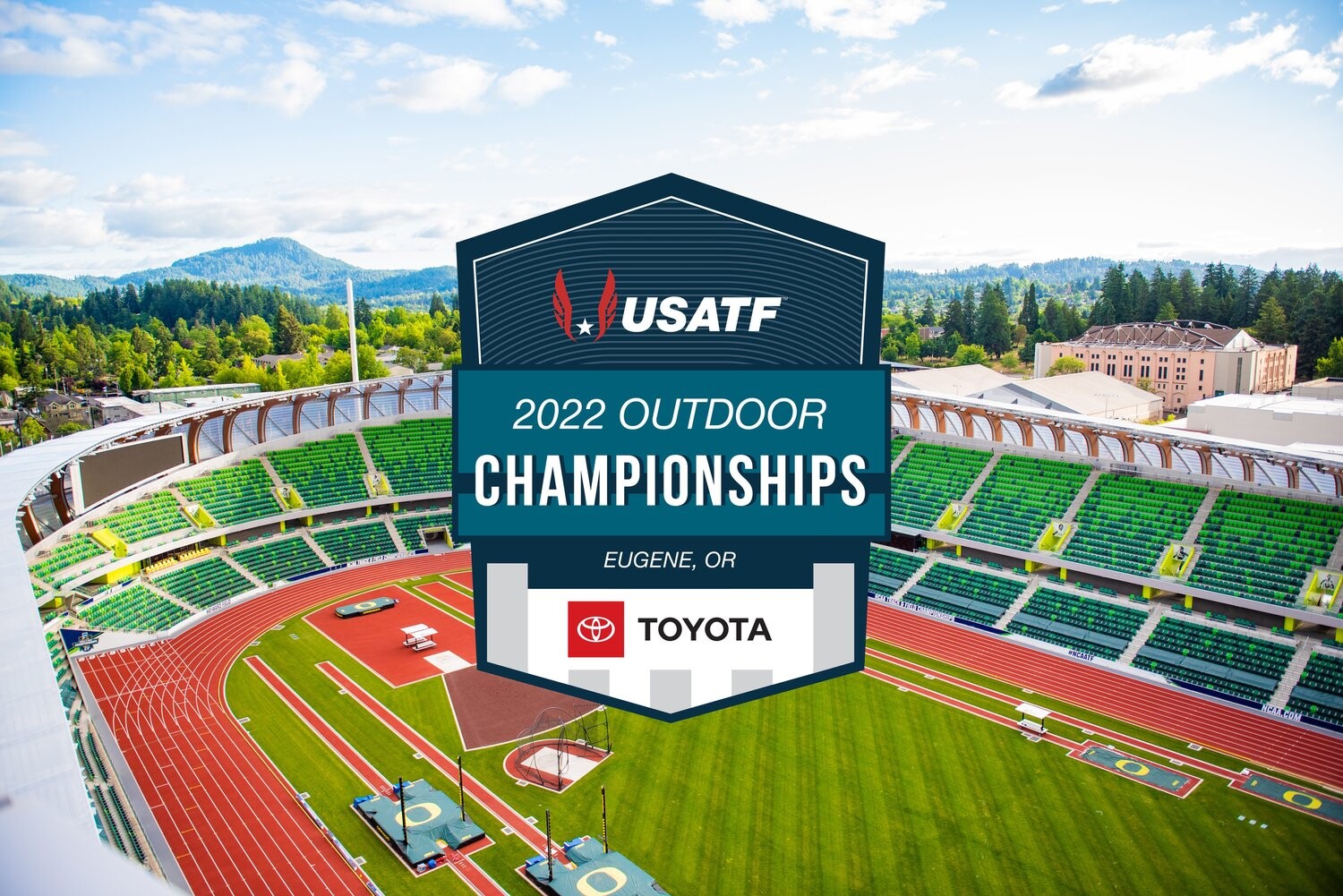
Day 1: Thursday 23 June
4:00 p.m. 800m Men First Round
4:25 p.m. 800m Women First Round
4:50 p.m. 400m Hurdles Women First Round
5:00 p.m. Hammer Throw Women Final
5:15 p.m. Long Jump Women Final
5:15 p.m. 100m Women First Round
5:40 p.m. 100m Men First Round
5:45 p.m. Discus Throw Men Final
6:05 p.m. 3000m Steeplechase Men First Round
6:35 p.m. 1500m Men First Round
6:53 p.m. 1500m Women First Round
7:11 p.m. 400m Women First Round
7:36 p.m. 400m Men First Round
Day 2: Friday 24 June
5:10 p.m. 100m Hurdles Women First Round
5:35 p.m. 100m Women Semi-Final
5:45 p.m. Long Jump Men Final
5:50 p.m. 100m Men Semi-Final
5:55 p.m. Pole Vault Women Final
6:05 p.m. 3000m Steeplechase Women First Round
6:15 p.m. High Jump Women Final
6:35 p.m. 400m Hurdles Men First Round
6:42 p.m. Shot Put Men Final
6:45 p.m. Discus Throw Women Final
7:04 p.m. 400m Hurdles Women Semi-Final
7:21 p.m. 100m Women Final
7:30 p.m. 100m Men Final
7:46 p.m. 800m Men Semi-Final
8:02 p.m. 800m Women Semi-Final
8:25 p.m. 400m Women Semi-Final
8:46 p.m. 400m Men Semi-Final
Day 3: Saturday 25 June
11:30 a.m. Javelin Throw Women Final
11:45 a.m. 200m Men First Round
12:00 p.m. Pole Vault Men Final
12:10 p.m. 200m Women First Round
12:15 p.m. Hammer Throw Men Final
12:30 p.m. Triple Jump Women Final
12:35 p.m. 110m Hurdles Men First Round
1:04 p.m. 100m Hurdles Women Semi-Final
1:22 p.m. 400m Hurdles Men Semi-Final
1:40 p.m. 1500m Women Final
1:52 p.m. 1500m Men Final
2:04 p.m. 3000m Steeplechase Men Final
2:21 p.m. 400m Women Final
2:31 p.m. 400m Men Final
2:41 p.m. 100m Hurdles Women Final
2:51 p.m. 400m Hurdles Women Final
Day 4: Sunday 26 June
12:15 p.m. Triple Jump Men Final
12:25 p.m. High Jump Men Final
12:30 p.m. 200m Men Semi-Final
12:35 p.m. Javelin Throw Men Final
12:46 p.m. 200m Women Semi-Final
1:00 p.m. Shot Put Women Final
1:04 p.m. 110m Hurdles Men Semi-Final
1:18 p.m. 5000m Women Final
1:40 p.m. 400m Hurdles Men Final
1:48 p.m. 800m Men Final
1:54 p.m. 800m Women Final
2:03 p.m. 5000m Men Final
2:23 p.m. 3000m Steeplechase Women Final
2:38 p.m. 200m Men Final
2:46 p.m. 200m Women Final
2:54 p.m. 110m Hurdles Men Final
Login to leave a comment
USATF Outdoor Championships
With an eye toward continuing the historic athletic success of 2022, USATF is pleased to announce competitive opportunities for its athletes to secure qualifying marks and prize money, including a new Grand Prix series, as they prepare for the 2023 World Athletics Championships in Budapest, Hungary.As announced a few months ago, the 2023 Indoor Championships in Nanjing, China have been...
more...University of Oregon seniors facing virtual graduation frustrated by Olympic Trials, track plans
When the University of Oregon announced in early February it will have a virtual commencement ceremony for the second year in a row, the university was met with frustration from some students — not because they wanted to shirk COVID-19 guidelines, but because they believed it was a double standard.
UO's virtual commencement ceremony is scheduled for June 12. A week later, the 2020 U.S. Olympic Team Trials for Track & Field will be held at Hayward Field on UO's campus.
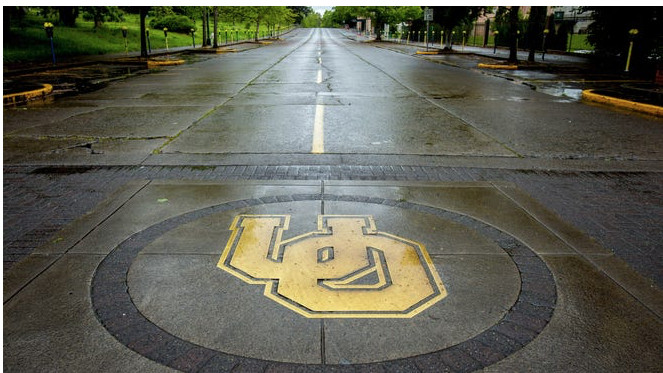
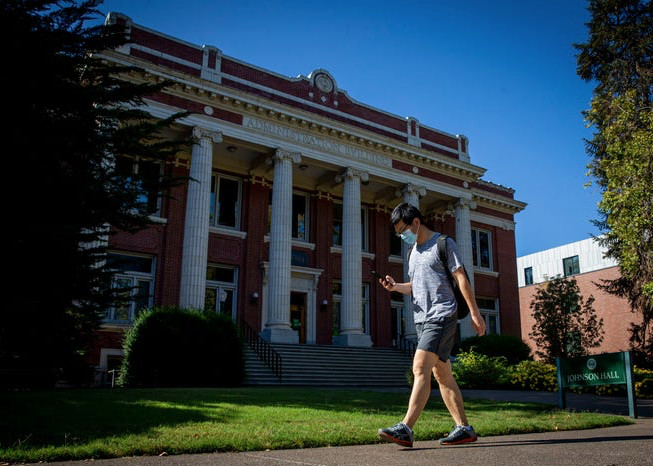
UO also announced this week it will host five collegiate track and field meets at Hayward, starting the weekend of April 2 and ending with the NCAA Championships June 9-12, the same week as graduation.
The university is not involved with the planning or organization of the Olympic trials. The trials are run by TrackTown USA, an outside party that contracts with UO for the use of Hayward Field.
Spectators are not welcome at the first NCAA meet, UO said.
While the university is unwavering on a virtual commencement, it is looking at adding some form of in-person activity for graduation.
For some students, though, it's not enough.
"I just want the (Olympic) trials and graduation to be held at the same standard — so either they both happen or they both don't," said Morgan Leone, a 22-year-old UO senior graduating in June. "And if they both don't, it's unfortunate they couldn't make it happen. (People) worked really hard for both of them, but I would love to see them both happen regardless."
Spring sports moving forward
The Olympic trials for track and field has been held at Hayward Field six times since 1972, though the first year only included men's events. The 2020 trials will be the seventh.
They are organized locally by TrackTown USA, a Eugene-based nonprofit organization that runs other large-scale track and field events. TrackTown has contracted with UO to rent space on campus for these events before, and this year is no exception.
The 2020 Olympics, which were postponed globally because of the COVID-19 pandemic, are scheduled to be held July 23 through Aug. 8 in Tokyo.
Although TrackTown consistently had to adjust plans for the trials, working with public health officials and the UO to adapt to changing policies, said CEO Michael Reilly, the organization still plans to host it in June.
"We are full-steam ahead in planning to host the Olympic trials in June," Reilly said. "We are remaining hopeful that the event is going to continue to be able to be held, and, the conditions here in Oregon and around the country continue to improve. But, if anything, we've learned over the last year we have to take things week by week."
UO sports such as softball, soccer and track and field are underway this spring. The NCAA has been regularly testing athletes for COVID-19 this year.
The Oregon track and field team will host five meets at the new Hayward Field this spring, which will "only be hosting guests of student-athletes and coaches as the meet schedule begins," and no spectators, Oregon Athletic Director Rob Mullens said.
More in-person activities will be allowed as guidelines change, potentially meaning spectators at events.
State guidelines vary standards
Lane County's risk level set by Oregon Health Authority has been dropping for several weeks. As the vaccination rate increased, the number of new cases has decreased significantly and as of Friday, the county was put in the "lower risk" category, which is the lowest category a county can be in.
"Even with Lane County moving into a lower risk category, the university’s educational and research activities are still restricted by the governor’s orders for higher education issued last June," UO spokesperson Molly Blancett told The Register-Guard in an email.
The governor's executive order notes that for research, residential and instructional activities, universities should follow what is directed from the Higher Education Coordinating Commission. It also states other activities on campus, such as athletics, need to comply with other executive orders and OHA guidance specific to the risk level of the county.
In the lower risk category, indoor classroom instruction cannot exceed 50 people, and outdoor classroom instruction 300 people, the HECC states. Outdoor recreation, including college athletics events, are allowed a maximum of 50% occupancy, according to OHA guidelines.
"These restrictions (for UO) are independent from activities organized by outside parties that have contracted to use UO facilities," Blancett said.
TrackTown's operating plans not set yet
However, TrackTown always has to comply with the policies laid out by UO on the use of the space, Reilly said, as part of the contractual agreement.
UO also will be paid by TrackTown for space used, as part of that contract. The exact dollar amount is still unclear, Reilly said, but will likely be set in the coming weeks as they come to better understand the amount of space the organization will rent from UO.
Lane County Public Health also is involved in Olympic trials planning and has been for past trials, Reilly said. When the time comes, TrackTown will present its plan to OHA.
"We fully expect a good rigorous analysis from them. We'll try to do our best to answer their questions that may evolve at that point, a need for us to adapt and change the operating plans that we're proposing," Reilly said.
"I imagine it's going to be an ongoing back-and-forth discussion with them in the coming weeks to try to arrive at a set of operating plans that they feel comfortable about," he said. "That will enable us to not only conduct a safe event for the participants there, but also do a good job of protecting the broader community."
UO entertaining in-person grad activities
The Olympic trials being contracted out to a third party doesn't change students' call for UO to seek alternatives for graduation.
"That really frustrated me in the sense that they're kind of hiding behind TrackTown," Leone said about UO. "I feel like they've been using that as an excuse.
"In a way like I feel like we signed a contract with the school, and we all paid our way through the university whether we liked it or not," she said.
"And it's frustrating to see that (UO) will be getting a paycheck out (from) TrackTown, and it seems very correlated to why they also want to keep pushing it to go on. I feel like the university tends to forget that we are also paying students and paid a lot of money to go here."
Leone is one of 1,600-plus people who have signed an online petition for UO to reconsider the decision to hold a virtual commencement and include more student input on alternatives.
The petition points out changes such as increased access to vaccines in Lane County, along with the track and field plans as reasons to reconsider.
UO announced there may be some opportunity for in-person activities at commencement, though the actual commencement ceremony will still be virtual. However, it's still unclear what these activities could be.
In a typical year, each school and college at UO (the business school, college of arts and sciences, etc.) has its own smaller commencement ceremony. This is where students actually have their names read and walk across stage to receive their degrees. Then there is a separate, university-wide commencement ceremony with speeches from UO President Michael Schill and other guests.
When asked whether these smaller school-specific ceremonies still were being considered, Blancett said UO is "actively exploring how it might add an in-person activity to complement planned virtual commencement ceremonies," but had nothing more to share at this time.
Students suggest safe alternatives
Leone set up a template email that students could fill out and send to UO leaders suggesting a way of doing in-person commencements. The program she uses shows about 200 people have used the template.
"It's basically suggesting doing many different ceremonies throughout the day at many different locations, without families, so Hayward, also at Autzen field, the EMU lawn," she said. "Everything I wrote followed the extreme risk guidelines, so it'd be 25 people outside all socially distanced ... it would be very strict, but at least families could tune in and watch."
With about 30 minutes per ceremony, following the most stringent guidelines the state has set, Leone said she calculated it would take a couple of days to get through everyone including the 2021 graduates, but it would be possible.
"I don't want anyone to think I'm disregarding COVID or trying to push for unsafe COVID activities," Leone said. "I just figured there are other universities working really hard to try and make something else safe. (UO) can absolutely do that for the seniors."
In the statement, UO's Blancett said UO is "eager to recognize students’ successes and achievements in meaningful ways."
"The health and safety of our community is a top priority, as is the ability to remain flexible while adhering to a rapidly changing guideline that may become more or less stringent over time," she said. "The safety of our campus community remains a top priority and a guiding principle as we navigate moving operations in and out of different risk levels."
Login to leave a comment
Will There Be Fans at the Hayward Field Olympic Trials? After 2020, holding the event at all will be a victory in itself
Compared to other pandemic-inspired dystopias, the rise of the avatar sports fan wasn’t horrible, so much as mildly depressing. The NBA’s Disneyland bubble (and recent All-Star game) had “virtual bleachers” where viewers could glimpse their spectral selves on screen. Then there was the strange analog equivalent where people paid $100 for the privilege of attending the Super Bowl as a cardboard cutout. In an era of increasing atomization, these images felt like a vision of a nightmare future where yet another in-person communal experience had been phased out. Last March, when asked about the prospect of competing in an empty arena, LeBron James’s initial response was, essentially, forget it. “If I show up to an arena and there ain’t no fans in there, I ain’t playing,” he said.
For track and field athletes, on the other hand, one could make the obvious joke that competing without spectators—as many runners did last year—would be business as usual. But even as having vacant seats at major championships remains a recurring issue for the sport, there are still places where, in pre-pandemic times, one could reliably find an infectious mass enthusiasm for watching fit people chase each other around the oval. In the United States, the most obvious example is, of course, Hayward Field in Eugene, Oregon, which is slated to host its fourth consecutive Olympic Trials in June. The venue’s combination of historical significance and high-energy fan base have always given it a special aura, colloquially referred to as the “Hayward Magic.” Even for those who don’t buy into the idea that occult forces might be wafting through the air of the Pacific Northwest, the quadrennial spectacle of the Trials at Hayward has delivered some big-time moments—starting in 1972 when Steve Prefontaine broke the American record in the 5,000-meters to punch his ticket to his first, and only, Olympic Games.
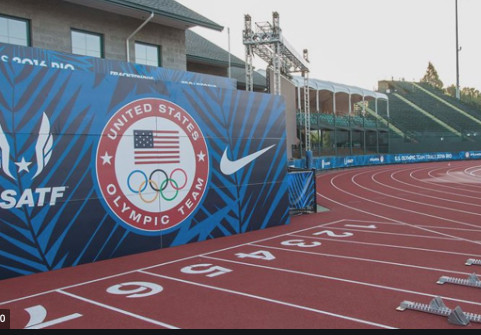
“This is a very special place for people who are really passionate about running,” says Eugene resident and two-time Olympic Trials champion Nick Symmonds. At the 2008 Trials, Symmonds was the first finisher in the famous “Oregon sweep” of the men’s 800-meters, where all podium spots were claimed by Eugene-based runners—to the roaring delight of the home crowd. While some have argued that it would be “better for the sport,” if U.S. track and field were less Oregon-centric, there’s no question that Hayward’s reputation for track fanaticism is justified. “At Hayward, you can have 10,000 people watching an early-season college dual meet,” Symmonds told me. According to a 2018 survey by the University of Oregon Foundation, the average attendance for weekday and weekend track meets at Hayward over the previous five years was 6,146 and 6,259 spectators, respectively. Those are impressive numbers for U.S. track and field. Symmonds told me that, as a professional, he had raced in national championships at other big venues across the country, like Des Moines and Sacramento, and likened the experience to competing in a “ghost town.” As he put it, “There was no one in the stands there to watch other than mom and dad.”
Unfortunately, the lingering reality of the pandemic might mean that even the Hayward Field Olympic Trials are destined for ghost town status. With fewer than 100 days to go (the Trials are scheduled to take place June 18th through 27th), it’s still uncertain whether spectators will be allowed to attend. COVID infection rates might be dropping as vaccines become more widely available, but the likelihood of packed stands by early summer seems remote.
“We are certainly hopeful that we will have fans at the Olympic Trials, but we are far from certain that that is going to be the case,” Michael Reilly, the CEO of TrackTown USA, the local organizing committee for the Trials, told me. Reilly generously pointed out that infection rates in Oregon had been “increasingly good.” Although the state is not yet allowing spectators at sporting events, Reilly said that his team was working with co-organizers like the United States Olympic and Paralympic Committee and USA Track and Field to apply for an exemption to submit to the governor’s office.
For now, the idea is to plan for a scenario in which fans will be allowed to attend with appropriate safety measures—testing, masks, social distancing, etc. (Reilly told me that it was still too soon to say whether the vaccine could play a role in any safety protocols.) “We are building operating plans that anticipate that spectators will be at the Trials,” Reilly told me. “If, for whatever reason, we can’t have fans, we will be prepared to go either way. Fortunately, many of the operations of the event, as it relates to conducting a track and field competition, really don’t depend on whether there are spectators.”
In a tantalizing irony, Hayward last year completed an extensive renovation that more than doubled its max seating capacity to 25,000. (The permanent seating capacity for the new facility is listed at 12,650, but it can be expanded to accommodate larger crowds.) The project, which is estimated to have cost around $270 million, transformed a relatively quaint facility into an opulent mega-stadium that includes a ten-story tower, a “hydrotherapy room,” and an on-site barbershop.
So far, the only athletes who have gotten to experience this architectural epiphany are members of the University of Oregon’s track and field team, leading Eugene’s Register Guard to posit that Hayward 2.0 is currently “little more than the most spectacular collegiate training facility in the nation.” As the paper reports, the university is hoping to host outdoor track meets later in the spring, culminating in the NCAA Outdoor Championships, which are scheduled to take place the weekend before the Trials.
Should both of these events end up happening without any spectators there’s still the silver lining that, hey, at least they weren’t canceled. And while it might be tempting to assume that all athletes prefer to race in front of a packed house, that, of course, isn’t necessarily the case. Molly Huddle, who won the women’s 5,000 and 10,000-meters at the 2016 Trials and will be looking to make her third Olympic team this June, told me that the first time she competed at a Hayward Trials in 2008, she was so stimulated by the crowd energy that she ended up running poorly. She says she had to consciously “de-sensitize” at subsequent Trials in order to run well enough to make the team. “It will probably not feel like Hayward, because of the new stadium and because there are no knowledgeable, dedicated fans there like there always are,” Huddle says about the prospect of competing at a spectator-less Trials. “Usually, I just try and pretend it’s just a mid-season meet to take the pressure off. So it will be easier to do that.”
Meanwhile, the organizing committee for the Tokyo Games has yet to decide on whether overseas fans will be allowed to attend. (According to a press release from the International Olympic Committee, a decision is expected in the coming weeks.) To be honest, it’s hard to imagine that there will actually be a ban on international visitors—not least because the Japanese government and the city of Tokyo reportedly spent more than $1.25 billion on the new Japan National Stadium—but, if 2020 has taught us anything, it’s to never say never.
by Outside Online
Login to leave a comment
USATF flips order of 5k/10ks at Olympic Trials. Why did they do this and who is it benefitting?
USA Track & Field (USATF), the United States Olympic & Paralympic Committee (USOPC), and the TrackTown USA Local Organizing Committee announced the release of the updated competition schedule for the 2020 U.S. Olympic Team Trials – Track and Field, that will take place June 18-27, 2021, at Hayward Field in Eugene, Oregon.
The updated schedule, in its entirety below, slightly differs from the schedule announced in 2020 with date changes for the men’s and women’s 5000m and men’s and women’s 10,000m.
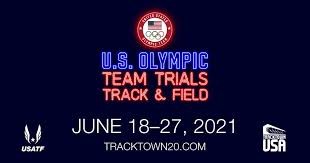
Men’s shot put qualifying at noon local time on Friday, June 18 is the first official U.S. Olympic Trials – Track and Field event at the new, state-of-the art Hayward Field. The final is later that evening, as well as qualifying for women’s discus, women’s high jump and triple jump, the women’s 1500m, along with the men’s 10,000m final to close out the first day.
The men’s decathlon bursts from the blocks on June 19, along with finals in the women’s discus and 100m rounding out the evening.
The opening weekend awaits the winner of the men’s decathlon, along with finals in the men’s and women’s 400m, the women’s 100m hurdles, men’s 100m final and field event finals in the women’s high jump and triple jump.
The events on Friday, June 25, bring qualifying in the men’s 200m and women’s 800m and the men’s discus throw and 3000m Steeplechase final.
On the final day, June 27, the women’s heptathlon champion is set to be crowned, along with a slew of other finals including the men's 200m and women’s 400m hurdles.
Tickets for the 2020 U.S. Olympic Team Trials are currently in a holding pattern due to the uncertainty of the COVID-19 landscape. The local organizing committee, TrackTown USA, is working diligently with public health officials on plans for the event, and updates on ticketing will be announced as soon as possible. Changing ticket orders or purchasing tickets are not possible at this time. Ticket holders with questions may contact the local organizing committee directly at info@gotracktownusa.com.
The 2020 U.S. Olympic Team Trials – Track & Field will be broadcast on NBC and its local affiliates. Broadcast information to be released at a later date. For the full competition schedule and athlete information, see the event page here.
Here are the changes.
Women's 10k initially scheduled for day 1 moves to day 9.
Women's 5k initially scheduled for days 7 and 10 moves to 1 and 3.
Men's 10k initially scheduled for day 7 moves to day 1.
Men's 5000 initially scheduled for days 1 and 4 moves to days 7and 10.
by USATF
Login to leave a comment
New dates are set for the 2020 US Olympic Trials
New dates for the 2020 U.S. Olympic Team Trials — Track & Field are set, USATF announced today. The event will take place June 18–27, 2021 in Eugene, Oregon.
The Tokyo 2020 Olympic Games were postponed due to the novel coronavirus, thereby necessitating the postponement of the corresponding Olympic Trials. USATF worked closely with the U.S. Olympic & Paralympic Committee and TrackTown USA to secure the new dates.
The competition schedule will remain much the same. While there is a possibility that some of the timings of the competition windows may shift, the events taking place on each day will not change.
The schedule of events can be found here. Existing ticket customers will have their tickets automatically rolled over to the new dates in 2021. Customers who wish to request a refund will be able to do so at TrackTown20.com beginning on Wednesday, April 22, 2020 at 9:00 a.m. Pacific time.
Ticketing policies and procedures for refund requests will also be available at TrackTown20.com on that day. This refund process will remain open for 90 days. The Olympic Trials will be contested in a new, state-of-the-art Hayward Field at the University of Oregon.The 2020 U.S. Olympic Team Trials – Track & Field will be presented across NBC Sports’ numerous platforms. Broadcast information will be released later.
Login to leave a comment
Tokyo 2020 Olympic Games
Fifty-six years after having organized the Olympic Games, the Japanese capital will be hosting a Summer edition for the second time, originally scheduled from July 24 to August 9, 2020, the games were postponed due to coronavirus outbreak, the postponed Tokyo Olympics will be held from July 23 to August 8 in 2021, according to the International Olympic Committee decision. ...
more...After coronavirus forces postponement of 2020 Tokyo Olympics, elite athletes share their sorrow
Former University of Oregon sprinter English Gardner was looking at the big picture when the news broke Tuesday that the 2020 Tokyo Olympics were being postponed for a year because of the worldwide coronavirus pandemic.
Gardner has a 2016 Olympic gold medal from the Team USA women’s 4x100 relay and big hopes for Tokyo.
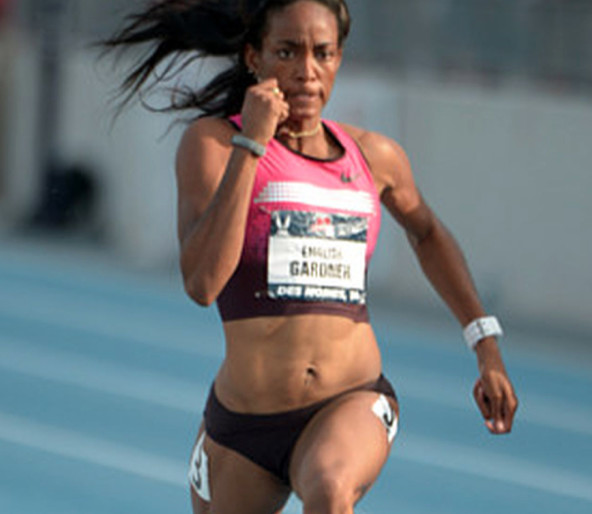
But she fully supports the decision by the International Olympic Committee and Japanese organizers to postpone.
“I’m bigger than track and field,” Gardner said. “I’m part of the community. I’m a human being. I’m a sister. I’m a mother. I’m a girlfriend. I’m a godmother. As a whole world, we’re kind of going through it right now. It’s OK that the Games got postponed because this problem, this illness, this sickness is way bigger than Tokyo.”
Gardner is among the Olympic-level athletes and coaches who spoke to The Oregonian/OregonLive on Tuesday about the postponement. They shared varying mixtures of relief, resignation, disappointment and hope for the future.
Shortly after the decision about the Olympics became public, the TrackTown USA local organizing committee announced the U.S. Olympic trials for track and field scheduled for June at Hayward Field in Eugene also had been postponed.
In most of the country, athletes are living in various degrees of social isolation as state, regional and municipal governments try to slow the spread of the virus. In many cases it has affected their ability to train.
Maybe worse has been the uncertainty of not knowing what the future holds and watching major sporting events be canceled or postponed, one after another. It seemed only a matter of time before the Olympics became the next domino to fall.
“I wasn’t super surprised,” said Shelby Houlihan of the Portland-based Bowerman Track Club and reigning USA Track & Field outdoor women’s champion in the 1,500 and 5,000 meters. “I figured it was probably going to happen. But it still kind of sucks.
“Obviously, it was probably for the best because of the situation we’re in. Safety should definitely be the No. 1 priority. But it does suck because I was ready for this year.”
Pete Julian coaches a Nike-sponsored, Portland-based team of elite distance runners who have been gearing up for the Olympics.
Julian’s group includes, among others, U.S. mid-distance stars Donavan Brazier, the 2019 world outdoor champion in the 800 meters, and Craig Engels, German star Konstanze Klosterhalfen and former University of Oregon runner Jessica Hull of Australia.
“I don’t think any of them are happy about the Olympics getting moved,” Julian said. “I think a lot of them feel they’re ready to go and believe they can win medals. They’re sort of kicking the post. They want to race.”
But Julian agrees with the decision to postpone. His message to his runners is they can be better in 2021 than they are now. He believes the Olympics can be too.
“I think Tokyo is one of the few cities in the world that could pull this off without a hitch,” he said. “I don’t think most of us can even imagine the logistical nightmare that this is going to create, and what the IOC and Tokyo will have to work through. But they will be able to do it, and it will be amazing.”
Evan Jager of the Bowerman Track Club is the 2016 Olympic silver medalist in the men’s steeplechase. He said he had a strong winter of training and liked his positioning heading into the outdoor season. But he believes this step back can turn to be a bigger step forward.
“Postponing it a year and having the Olympics as that light at the end of the tunnel is going to be a very positive thing to look forward to,” Jager said. “We can come out of this crisis a year from now, and hopefully be healthy. The Olympics can be a celebration of getting out of these dark times.”
Marathoner Galen Rupp said he planned to keep training and keep perspective.
The former University of Oregon star won an Olympic silver medal in the men’s 10,000 meters in 2012 and a bronze in the marathon in 2016. He already had made the 2020 U.S. Olympic team by winning the marathon trials on Feb. 29 in Atlanta.
“The health, safety and well-being of the global population are of the utmost importance and beyond any sporting event,” Rupp said. “Already so many people have gotten sick or died and so many more have been greatly impacted by the coronavirus. We need to listen to the advice of health experts.”
Even if that means going dark in 2020 and waiting a year so the coronavirus can be contained.
Gardner, the former UO sprinter who lives in New Jersey, said training has become difficult because of quarantine containment regulations. She joked she has to get creative to do track workouts because of padlocked facilities.
“I’ve been hopping a lot of fences,” she said. “I’ve been working on my long jump and high jump approaches.”
But turning serious, she said she endorsed the quarantines and social-distancing rules as a way to keep vulnerable family members safe. She said the Olympic postponement would protect athletes and fans.
“I was mostly concerned that we would calm the virus down, we all would go to Tokyo and spur it back up again,” Gardner said.
She said it could hit athlete housing in Tokyo the way an outbreak of the norovirus struck at the 2017 World Outdoor Championships in London.
“We share common eating rooms,” she said. “We all share the same tracks, the same weight rooms, the same hotels. It would just be a matter of time before it spurred back up again.“
by Oregon Live
Login to leave a comment
After postponement of 2020 Tokyo Olympics, elite athletes share sorrow, perspective
Former University of Oregon sprinter English Gardner was looking at the big picture when the news broke Tuesday that the 2020 Tokyo Olympics were being postponed for a year because of the worldwide coronavirus pandemic.
Gardner has a 2016 Olympic gold medal from the Team USA women’s 4x100 relay and big hopes for Tokyo.
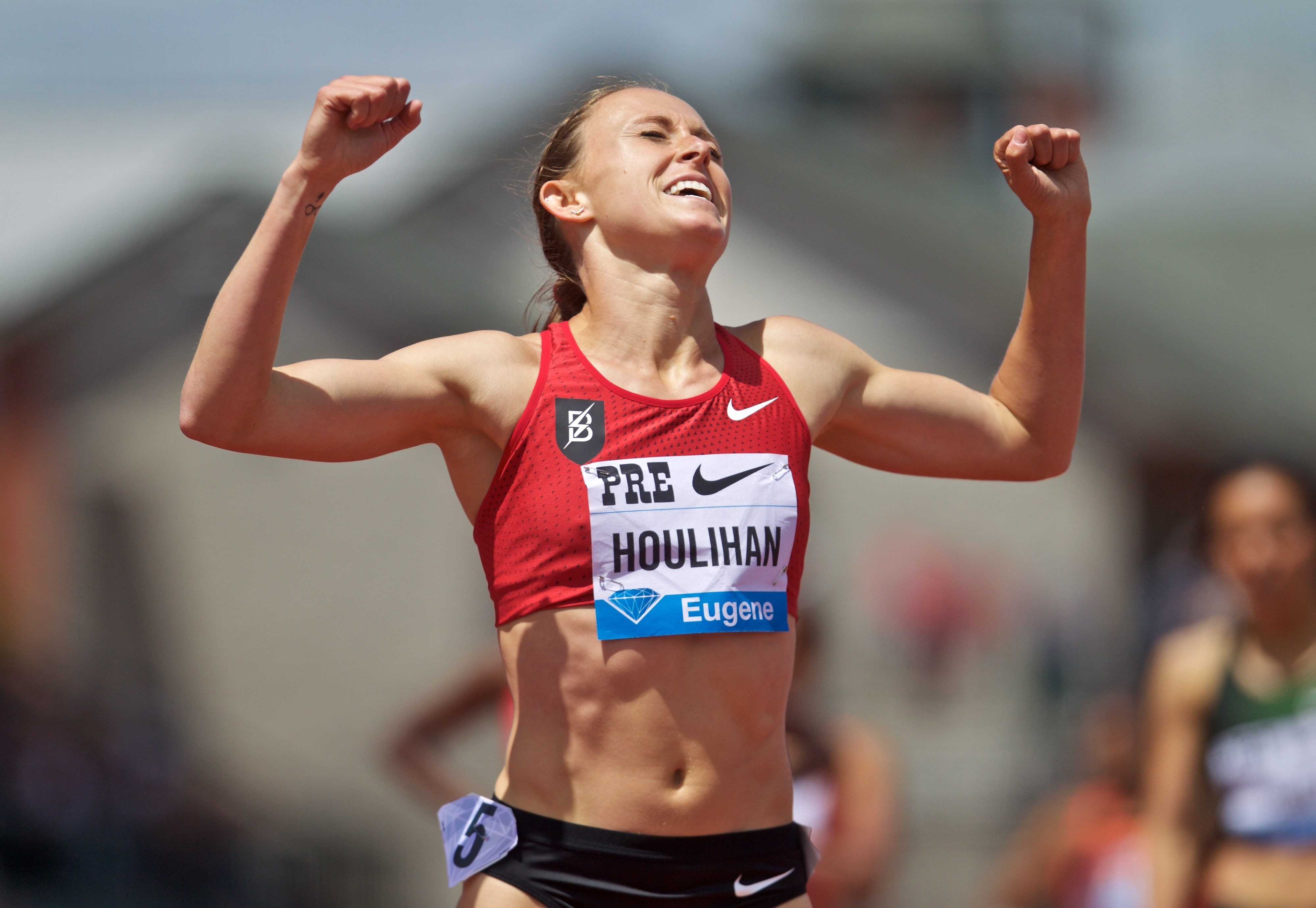
But she fully supports the decision by the International Olympic Committee and Japanese organizers to postpone.
“I’m bigger than track and field,” Gardner said. “I’m part of the community. I’m a human being. I’m a sister. I’m a mother. I’m a girlfriend. I’m a godmother. As a whole world, we’re kind of going through it right now. It’s OK that the Games got postponed because this problem, this illness, this sickness is way bigger than Tokyo.”
Gardner is among the Olympic-level athletes and coaches who spoke to The Oregonian/OregonLive on Tuesday about the postponement. They shared varying mixtures of relief, resignation, disappointment and hope for the future.
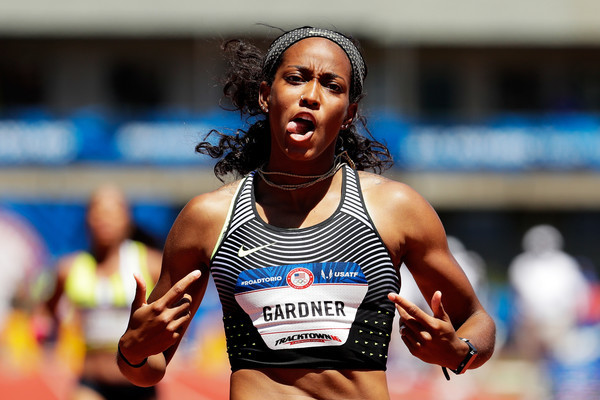
Shortly after the decision about the Olympics became public, the TrackTown USA local organizing committee announced the U.S. Olympic trials for track and field scheduled for June at Hayward Field in Eugene also had been postponed.
In most of the country, athletes are living in various degrees of social isolation as state, regional and municipal governments try to slow the spread of the virus. In many cases it has affected their ability to train.
Maybe worse has been the uncertainty of not knowing what the future holds and watching major sporting events be canceled or postponed, one after another. It seemed only a matter of time before the Olympics became the next domino to fall.
“I wasn’t super surprised,” said Shelby Houlihan of the Portland-based Bowerman Track Club and reigning USA Track & Field outdoor women’s champion in the 1,500 and 5,000 meters. “I figured it was probably going to happen. But it still kind of sucks.
“Obviously, it was probably for the best because of the situation we’re in. Safety should definitely be the No. 1 priority. But it does suck because I was ready for this year.”
Marathoner Galen Rupp said he planned to keep training and keep perspective.
The former University of Oregon star won an Olympic silver medal in the men’s 10,000 meters in 2012 and a bronze in the marathon in 2016. He already had made the 2020 U.S. Olympic team by winning the marathon trials on Feb. 29 in Atlanta.
Evan Jager of the Bowerman Track Club is the 2016 Olympic silver medalist in the men’s steeplechase. He said he had a strong winter of training and liked his positioning heading into the outdoor season. But he believes this step back can turn to be a bigger step forward.
by Ken Goe
Login to leave a comment
Tokyo 2020 Olympic Games
Fifty-six years after having organized the Olympic Games, the Japanese capital will be hosting a Summer edition for the second time, originally scheduled from July 24 to August 9, 2020, the games were postponed due to coronavirus outbreak, the postponed Tokyo Olympics will be held from July 23 to August 8 in 2021, according to the International Olympic Committee decision. ...
more...USA Track & Field is expected to name the University of Oregon's Hayward Field in Eugene as the site for the 2020 U.S. Olympic trials
Login to leave a comment
Tracktown USA hopes to be selected to host the USATF 2020 Olympic Trails
Login to leave a comment
Is the 2021 World Championship going to be in Track Town USA?
Login to leave a comment


